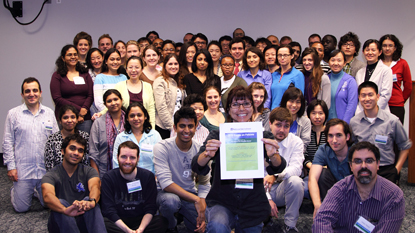The Training Page
NEI Builds a Community for Scientists in Training
Led by NEI Deputy Scientific Director Sarah Sohraby, the NEI intramural training program is helping research fellows balance work-life issues and become more competitive in the workplace.
Training programs offered by individual institutes and centers (ICs) “play a vital a role in complementing efforts organized by the Office of Intramural Training and Education” (OITE), said Lori Conlan, director of OITE’s Office of Postdoctoral Services. The OITE hosts a curriculum of career-development topics aimed at scientists-in-training across NIH.
NIH hosts about 5,000 trainees, many of whom are from foreign countries. Getting lost in the shuffle is far too easy. About 120 trainees are at NEI, which also hosts about 30 interns each summer. “The NEI has built a very strong community within their training program,” Conlan said.

PHOTO BY T. MICHAEL REDMOND, NEI
Sarah Sohraby, front-center, with Cesar Perez-Gonzalez, front-right, and NEI fellows at the 2012 NEI Focus on Fellows retreat.
A community is what Sohraby envisioned when she took charge of the NEI training program in 2006. Sohraby, who’s from Belgium, was an NIH postdoc at the National Heart, Lung, and Blood Institute (NHLBI) in 1980-1983. She said she relied on her peers and mentors for career advice and felt fortunate to have landed in such a supportive environment. Some of her contemporaries had a harder time cultivating their careers.
She left NIH to continue her training and then spent 18 years in research and teaching positions in the medical and engineering schools at Belgium’s Université Libre de Bruxelles (Brussels). When she returned to NIH in 2006 as NEI’s deputy scientific director, she drew on her experiences as a postdoc as she began directing the institute’s intramural training program. She instituted entrance interviews to orient fellows when they arrived at NIH, as well as exit interviews when they left, to garner feedback about the strengths and weaknesses of the NEI’s training activities. Sohraby strongly encouraged fellows to take advantage of OITE services, too, including its weekly seminars on topics such as understanding workplace dynamics, test-taking skills, résumé writing, and job hunting.
“Tenure-track, and good research positions in general, are more difficult than ever to obtain,” said NEI Scientific Director Sheldon Miller. “Biomedical research is increasingly interdisciplinary, which means scientists who seek tenure-track research faculty positions must build critical communications skills earlier in their careers to compete in the workplace. Skills such as good speaking, writing, and networking are essential.”
Sohraby established quarterly group meetings for fellows to discuss important training-related issues and to help them practice presenting their research to their peers in a variety of formats, including talks without slides. And she established a two-day fellows retreat, Focus on Fellows, which has become an annual event that encourages fellows to gain perspective on their lives and careers as scientists. The event offers prizes for the best trainee presentations and features talks by noteworthy scientists who, in addition to presenting their research, are asked to reflect on their career journeys.
Trainees consider the retreat’s career-development roundtables especially valuable. Scientists or professionals in science-related occupations facilitate discussions that engage fellows in issues ranging from improving grant submissions, to linking basic science research and clinical work, to transitioning to alternate career paths. Miller said he knows of several fellows who made critical career choices based on these roundtable discussions.
In addition to planning and conducting training events, the NEI intramural training staff maintains an open-door policy to encourage trainees to seek guidance as issues arise.
“We see the fellows as part of a big family,” said NEI Scientific Program Administrator Cesar Perez-Gonzalez, who gladly offers guidance on challenging topics such as resolving disagreements in the workplace or more straightforward issues such as writing résumés and cover letters. He is currently exploring the feasibility of establishing career-development plans for each trainee.
To learn more about NEI’s intramural training resources and opportunities, visit http://www.nei.nih.gov/training or contact Perez-Gonzalez at cesarp@nei.nih.gov. To learn more about OITE services, visit its Web site at https://www.training.nih.gov.
This page was last updated on Friday, April 29, 2022
